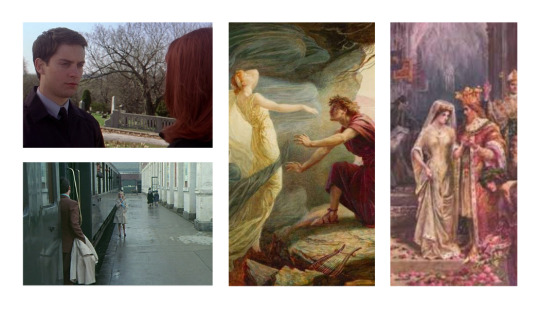#this is the most nerdish thing I've ever written
Note
Hi , I hope you are doing well. I just want to ask, you have mentioned in one of your post Ginny's name symbolic for hinny being soulmates. please elaborate on that bit.
Thank u
Let's clarify something, I've never said this. I want it to be put on record.
[Also, thank you, I hope you are well, too]
What I did say is that soulmates dynamics usually rely heavily on symbolism. Because soulmates are not a proven real thing, unless they exist explicitly in the worldbuilding of the story, the author uses symbolism to communicate with the reader that yes, they are very conscious of what they are writing, it's written on purpose, those characters are meant for each other. Symbolism is also the literary translation of fate and destiny, obviously essential elements when talking about soulmates. Clearly, the whole symbolic level of narration means nothing in terms of the soulmates storyline if the dynamic of the couple doesn't support it (Harry and Ginny's one does).
Now, one of the many symbolic elements in Harry and Ginny's story is Ginny's name.
Let's see why.
Ginny's full name is Ginevra, an Italian name that comes from the ancient Welsh name Gwenhwyfar. Ginevra means bright spirit, or even bright elf (if someone is in the mood to write a LotR hinny AU).
Ginny throughout the series is often associated with light and warmth, both on a direct level and on a more metaphorical one, and in the last book, she is even directly described as a brilliant light. She Harry's light, she is life itself.
Therefore Ginny's name fits perfectly into the whole symbolic system around her character, a character who is actually one of the main columns of the symbolic system of the entire saga.
It doesn't end here, though.
Ginevra is the Italian version of the name Guinevere.
Guinevere happens to be the wife of King Arthur. The Arthur hero of the legend, like our Harry.
But here is when it gets interesting.
Guinevere is also pretty famous for having cheated on Arthur, this is the complete opposite of Ginny who has been devoted to Harry since before they even met in a way. Ginny has always loved Harry, even when she really didn't want to, and will always love him.
Does this mean that calling Harry's future wife Ginevra was a poor choice?
No.
Referencing a famous story, using it as a trope if you will, but then changing the ending is something that Rowling does on more than one occasion and various times specifically with Harry and Ginny.
Ginny running after the train and Harry looking at her in PS is reminiscing of many love stories, but instead of being a painful goodbye with a promise of a reunion, it's a hello. It's the first time they meet.
Harry saving Ginny from the Chamber is a situation built in a way that strongly references Orpheus and Eurydice but Harry, unlike Orpheus, manages to actually save Ginny.
In the break-up scene between Harry and Ginny, you can see the usual pattern of the hero breaking up with the love of their life because they consider themselves too dangerous, but usually what happens is that the hero lies about their own feelings in order to make sure the love interest stays away, a White Fang situation if you will. A type of scene that is reminiscent of the ending of the highly successful first Spider-Man movie (that came out only three years before HBP and might have easily influenced JKR) where Peter refuses MJ, and at a funeral of all moments. But with Harry and Ginny, Rowling once again adds her own twist. Harry doesn't lie to Ginny, he is extremely honest about his reasons and emotions, and even the things he can't tell her are things that Ginny already knows even if not in detail (that he's going after Voldemort).
In conclusion, Ginevra is definitely a name chosen very carefully. You can like it or not, but Harry and Ginny's story is one of the most clearly meticulously crafted dynamics of the series.

Fun fact: the Italian version of the name is also associated with the juniper (ginepro in Italian). The juniper in many cultures - from the ancient Greek to the Celtic one - is linked to magic and protection (Ginny is a powerful witch, and one of her arcs is her being a protector of others). Particularly in Mesopotamian mythology, it was the plant of the goddess Ištar, goddess of sex and war, who could bring death and destruction but also love and fertility (Ginny's character is basically a delicate balancing act between harshness and sweetness). To add to this, her animal was the lion (Ginny is a leo).
#this is the most nerdish thing I've ever written#harry potter#ginny weasley#harry x ginny#hinny#arthur and guinevere#peter and mj#orpheus and eurydice#thegirlwhowrites642HPmeta
107 notes
·
View notes